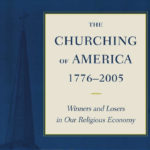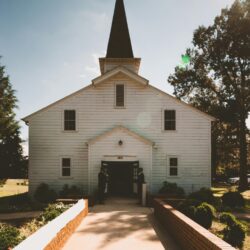By Joe Epley
Unassuming. Overlooked. Unimportant. Disinteresting.
At times, rural communities have been assigned these terms by outsiders who, at best, muster up decidedly apathetic words to describe small, out of the way, places. While lack of care for small towns remains a concern, it pales in comparison to some of the demeaning words people attribute to rural communities.
Dysfunctional. Poverty-minded. Regressive. Declining. Hostile to outsiders.
These words have served as the foundations for some of the negative stereotypes about rural places, and, more importantly for our discussion today, about rural churches, that exist in popular culture. However, others choose to see rural places and churches through a different lens. To those willing to look closely, they see potential in the very DNA of rural communities. The mutual dependence and close-knit nature of rural relationships, coupled with ingenuity, creativity, and a commitment to the good of the community, stand out as positives for those willing to look through new eyes.
Recently, I had the privilege to talk with pastor Bryan Jarrett, lead pastor of Northplace Church in Dallas, TX, and founder of the Water Tower Network, a ministry designed to equip rural pastors to build God’s kingdom in their context. Pastor Bryan described the valuable nature of rural ministry and what led him to pursue developing resources for the rural churches, and the principles he believes can help ministers succeed in this vital work for the Gospel.
The interview revealed a common story centered around the theme of “journey.” Jarrett entered a personal journey to become an advocate for rural churches. Water Tower Network invited pastors on a journey to more effective ministry in rural places. The invitation for this journey extends to the readers of this article, wherein you may approach rural ministry with newfound confidence and begin to understand the importance of the role in God’s kingdom and the principles.
To begin, it is not an understatement to find airport napkins as unlikely recipients of God-inspired ideas. However, as Jarrett sat in the airport terminal in Chicago waiting for a connecting flight, there may as well have been a burning bush in front of him. Suddenly, God dropped a vision in his heart to invite rural pastors on a yearlong journey of spiritual refreshing, spiritual formation, and an infusion of value to inspire confidence and empowered ministry in their context. This cohort of ministers would serve to continue encouraging each other after completing the yearlong journey.
While the revelation did indeed feel quite sudden, Jarrett explained that it resulted from a long process. When Jarrett left his small town and headed to Bible college, he did so with the intent of never looking back. He wanted to leave behind all the negative aspects of small town living in order to go and make a big kingdom impact. However, as his calling progressed, Jarrett began to appreciate the rural communities’ true potential: a mission field. The rural church ministry calls for the courage to embrace a cross-cultural calling. It demands committed ministers and steadfast faith. It tests the resolve of those who decide to live there, promising high costs for what can feel like unseen rewards. Jarrett noticed that the Church applauded those who boldly sacrificed a comfortable lifestyle to travel overseas and serve small churches on other continents, and reasoned that rural churches deserved the same respect and admiration.
Along the way, Jarrett picked up principles that he considers core values for those who wish to see the kingdom of God gain ground in their small communities. As we talked, I recognized the ease with which he spoke the words of each principle. The well-rehearsed phrases whispered of the Holy Spirit’s consistent and caring work in rural communities. While practical in nature, the guiding principles also carried an incredible sense of hope and encouragement.
1) Create, cultivate, and contend for a Gospel-centered culture.
The Gospel is God’s ultimate answer to rural congregations who struggle with accepting outsiders. In general, most recognize the tight-knit nature of rural communities, and while this quality may serve as an incredible asset to unity, it can unintentionally result in a church that subtly rebuffs the “different” people that visit them Sunday to Sunday. The rural ministry becomes an incredible opportunity to engage in the constant battle against this temptation by exemplifying, teaching, living, vision-casting, and fighting for the radical love of the Gospel.
2) Celebrate the positive changes.
Culture shift often begins by celebrating each positive change. Pastor Bryan asked some rather hard questions, drawing on his own experience.
- Do we highlight the negative ways in which church growth impacts the lifelong congregants?
- Do we reinforce the loss of certain norms instead of reinforcing the creation of new ones?
- Do we speak often from our pulpits of the financial lack, stagnating growth, current church squabble, or other petty business?
- Do we instead focus on the stories of those living the Gospel authentically in front of their rural neighbors?
According to pastor Bryan, you will always get what you celebrate.
3) Strive for excellence.
Rural churches face the temptation to settle for a contented “average” in a small-town setting where change happens at a slow pace and the competition does not seem as fierce. However, the internet age has made the best preaching, worship, stage design, small group ministry, and Christmas production available to even a casual churchgoer. While I am not recommending you figure out how to rig your small stage with pyrotechnics for the birth of Christ next year, Jarrett encourages pastors to refuse to settle for second quality ministry. Instead, the church should include the very best sermon, prayer breakfast, nursery, Sunday school lesson, church potluck, Thanksgiving outreach, and small group session conducted with excellence in mind. We should seek to do our best, practically speaking, for the sake of honoring God and loving his people.
4) Learn to be present—but differently.
In a small town, “being present is part of the mission.” This includes the pastor visiting every member in the hospital, attending important sporting events or life events, and consistent present in the lives of parishioners. However, a growing church demands a shift in the role of pastor. Rural pastors committed to growth may need to find new ways to celebrate “being present” in the lives of the people. The pastor who can mobilize the church for involvement in each other’s lives leaves room for God to grow that church through more and more empowered people working to serve God’s kingdom.
While these principles represent some of the big ideas Jarrett applies in rural churches, the cohort of rural pastors that meets annually through the Water Tower Network takes it a step further. Jarrett grew excited as he spoke about the program. Committing to the journey for a year, each cohort members’ only expense included travel, six times in a year, to Dallas for an incredible journey of spiritual formation and comradery. The goal for each pastor and spouse to leave the sessions filled with a renewed sense of calling, an unshakable resolve for the task of rural ministry, and a deep sense of value for the work they do in God’s kingdom inspires this ministry.
As our conversation drew to a close, I asked Jarrett how to apply for the one-year cohort. He assured me that all those who reach out will receive information concerning when registration for the next cohort opens. Pastors interested in such a journey can reach out to the Water Tower Network at kara@northplacechurch.com for the registration information when the next cohort becomes available.




















